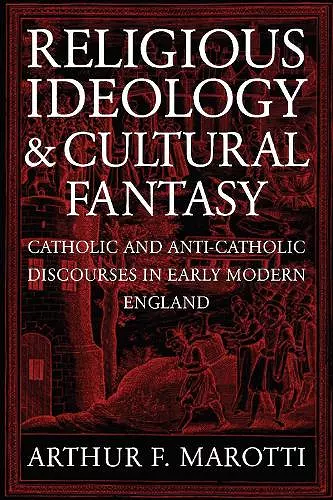Religious Ideology and Cultural Fantasy
Catholic and Anti-Catholic Discourses in Early Modern England
Format:Hardback
Publisher:University of Notre Dame Press
Published:5th Oct '05
Currently unavailable, and unfortunately no date known when it will be back
This hardback is available in another edition too:
- Paperback£19.99(9780268034801)

In this new book, Arthur F. Marotti analyzes some of the rhetorical and imaginative means by which the Catholic minority and the Protestant majority defined themselves and their religious and political antagonists in early modern England. He considers Catholic writings that have been relatively neglected, as well as the discourse of anti-Catholicism. Straddling the boundary of history and literature, this study offers an intriguing cultural history that focuses on the ideologized fantasies and language found on both sides of the early modern Christian religious divide. Marotti focuses on the period between the arrival of the first Jesuit missionaries in England in 1580 and the climax of ongoing religious conflict in the Restoration-era Popish Plot and the 1688 Glorious Revolution. In a series of thematically focused essays, he covers such issues as the relationship of print culture to the residual Catholic culture in Elizabethan England; recusant women, Jesuits and the cultural othering of Catholics, martyrdom accounts, the manuscript circulation of Catholic martyrdom accounts; polemically charged Catholic and Protestant narratives of conversion; and the depiction of Catholic plots or outrages and providential Protestant deliverances in the construction of Protestant English history and identity. This important and eagerly anticipated book makes a substantial contribution to our understanding of Catholicism and anti-Catholicism in the early modern period. It also points to a cultural dynamic in Anglo-American history that persisted far into the modern era.
“Professor Marotti’s book makes a constructive addition to the literature on religious conflict in early modern England. . . The primary value of the volume is his addition of Catholic sources to a discussion that among literary critics has been largely confined to their opponents.” —The Catholic Historical Review
“Superb. . . . Religious Ideology and Cultural Fantasy is modestly disguised as a record of the imaginative life of the oppressed Catholic community in England—less a minority than a silenced and stricken majority—and of the cultural fantasies by which they and their Jesuit priests were steadily demonized in text, trial and on the scaffold. Its significance is much greater. The stories told in this book were taken as true by generations of Englishmen; they formed—and to some extent still form—part of British identity. . . .” —Times Literary Supplement
“This book is in itself an index of the degree to which the study of English recusant literature, and of the literary and controversial writings of the English Catholics, has entered the mainstream of literary and historical debate. Indeed, it should be honoured as something of a monument in the history of this area of scholarship.” —Archivum Historicum
“Religious Ideology and Cultural Fantasy makes a significant contribution to the literature and understanding of this period of passionately held faiths in conflict, of blurred political and religious identities, and of martyrs, royals, disguised religious, and troubled service of two (or more) masters—or the appearances thereof. Marotti’s endnotes deserve special mention. Because he employs so many rarely cited sources, historians will find these extensive listings a valuable and productive resource. This volume is an adept and adroit study of a crucial period in Catholic life in a time when Counter Reformation was a distinctly personal, daily, and uncomfortably mortal aspect of a Catholic’s life.” —Cistercian Studies Quarterly
“Marotti . . . has written a book that is encyclopedic in scope, examining dozens of examples of English Recusant literature together with an ample supply of counter-examples from the Protestant majority. This literature had enormous impact on the political motivations of certain parties, and Marotti lays these out with considerable skill. This highly recommended volume surely will be of use to specialists in tracking the trajectory of English recusancy, though graduate and undergraduate readers in programs dealing with British literature will also take away much from Marotti’s exacting monograph.” —Catholic Library World
“Arthur F. Marotti’s Religious Ideology and Cultural Fantasy: Catholic and Anti-Catholic Discourses in Early Modern England restores visibility to the Catholic Other demonized by the Protestant Reformation in his exploration not about Catholics and especially about English Jesuits. Simultaneously impassioned and reasonable, Marotti’s work goes beyond a study of cultural operations to restore a sense of why these operations mattered, how they were experienced, and how they caused very real suffering and death.” —SEL: Studies in English Literature
“. . . [Marotti] investigates the spirited conflict between Papists and Protestants from the time of Queen Elizabeth I to the Glorious Revolution of 1688. Studying the use of printed material, the portrayal of martyrdom, the role of women and zealots, and Papish plots that threatened all levels of society, Marotti offers insight into a world not unlike our own.” —History
“. . . The book’s coverage is broad; and though several of these essays have been reprinted from previous collections, they have a striking unity of purpose. . . Marotti’s study is probably the nearest ting we have to a survey: proudly anti-canonical, but also looking towards a new canon.” —Early Modern Literary Studies
“. . . Compelling and immensely readable . . . Marotti specifically chooses not to examine the canonical literature of the time in order to focus instead on the literature of religious controversy, in particular how the printing press affected the Reformation in England. He examines how opposing factions (Catholic and Anti-Catholic) used the printed word in an attempt to influence their respective audiences and characterize the times.” —Religion and the Arts
“Marotti’s well-researched account is convincing and informative. . . .” —First Things
ISBN: 9780268034795
Dimensions: 229mm x 152mm x 19mm
Weight: unknown
320 pages